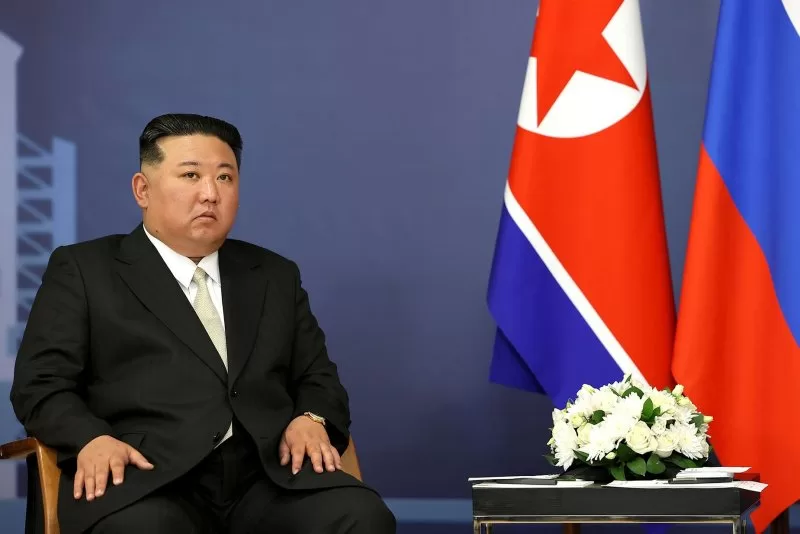SEOUL, Nov. 19 (UPI) — North Korean leader Kim Jong Un met with the leader of a Russian delegation in Pyongyang and called for deeper economic and scientific ties between the two countries, state media reported Tuesday, amid an already heightened military cooperation.
Kim sat down with Russian Minister of Natural Resources and Ecology Alexandr Kozlov for one-on-one talks Monday, state-run Korean Central News Agency reported. Kozlov and his delegation were in North Korea for a meeting of the intergovernmental committee for cooperation in trade, economy, science and technology.
During the session, Kim noted that bilateral cooperation has grown under a new treaty between the two countries. Moscow and Pyongyang signed a comprehensive strategic partnership treaty in June, which includes a mutual defense clause that calls for mutual military assistance in the event either country is attacked.
North Korea ratified the pact last week.
“It is necessary to mutually and powerfully propel the co-prosperity and development of the two countries by further promoting the inter-governmental trade, economic, scientific and technological exchange and cooperation in a more extensive and diversified way,” Kim said, according to KCNA.
Relations between the countries have reached a “new strategic level,” Kim added.
In a separate report on Tuesday, KCNA said that a delegation from Russia’s Military Academy of the Armed Forces’ General Staff arrived in Pyongyang the previous day.
Pyongyang has been assisting Moscow in its war against Ukraine by sending munitions and, more recently, troops to Russia.
The Pentagon said Tuesday that more than 11,000 North Korean troops had moved into the Kursk region of southwest Russia, where Ukrainian forces have occupied hundreds of square miles since a surprise incursion in August.
The U.S. State Department and Ukrainian military intelligence have reported that North Korean forces have already begun combat operations.
During a press briefing, spokeswoman Sabrina Singh said that the Pentagon had not yet confirmed the reports but noted the North Korean troops are “moving into Kursk for a reason.”
“We have every expectation that they would be engaging in combat operations,” she said.
“North Korea entering this war makes them co-belligerents with Russia and we’re talking about North Korean soldiers being used to take Ukraine’s sovereign territory and continue to push this war forward,” Singh said. “Certainly we view [that] as escalatory.”
U.S. President Joe Biden, South Korean President Yoon Suk Yeol and Japanese Prime Minister Shigeru Ishiba issued a joint statement at the Asia-Pacific Economic Cooperation summit in Peru last week condemning North Korea’s decision to deploy troops to Russia for combat against Ukraine, saying the move will “dangerously expand Russia’s war of aggression.”
North Korea’s hosting of the Russian trade delegation appears to be aimed at receiving maximum compensation for the troop deployment, an official from South Korea’s Unification Ministry told reporters.
The meeting between Kim and Kozlov “seems to be intended to express expectations for economic exchanges between the two countries and to demonstrate the close ties,” a ministry official told reporters, according to news agency Yonhap.
Both Russia and North Korea are under heavy international sanctions, but the military cooperation is believed to be delivering much-needed funding to Pyongyang via weapons sales and payments for troops.
During a meeting with foreign journalists in Seoul last week, analyst Doo Jinho of government-funded think tank Korea Institute Defense Analyses estimated that North Korea could receive more than $700 million per year for dispatching the soldiers.
South Korean officials have also raised concerns over Moscow sharing missile and nuclear technology with Pyongyang. Seoul’s military intelligence said last week that North Korea’s new Hwasong-19 intercontinental ballistic missile, test-fired on Oct. 31, could have been developed with Russian technical assistance.
On Monday, Kim Jong Un called for North Korea to expand its nuclear arsenal “without limit” in response to what he called a “frantic” military buildup in Asia led by the United States.
